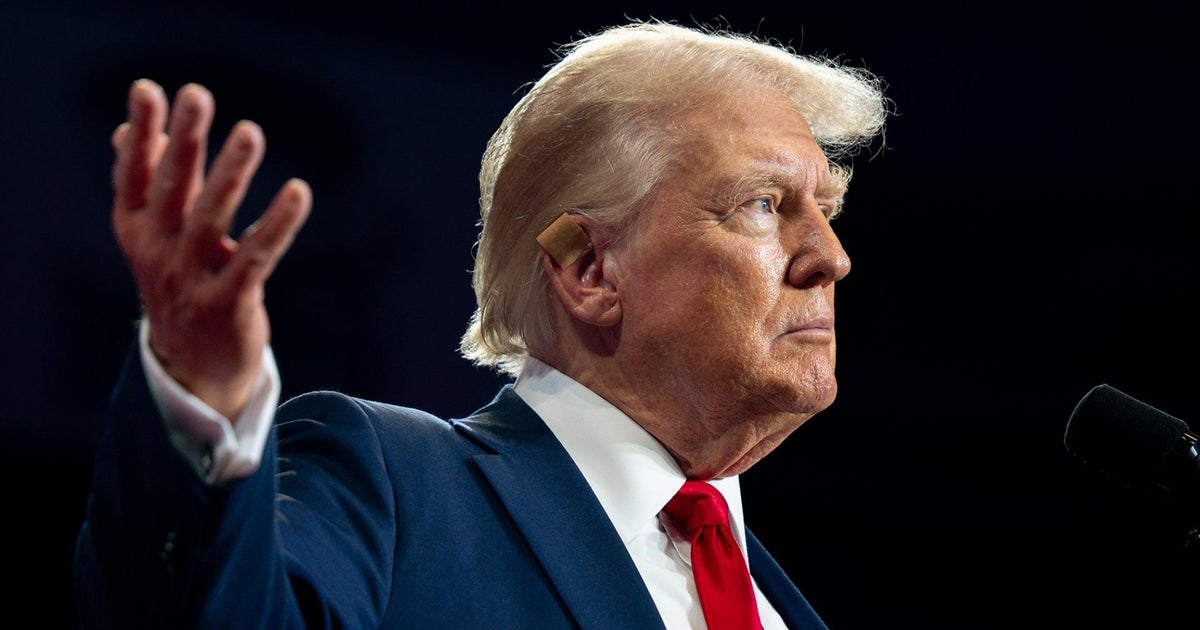By Olivia Gazis
/ CBS News
7/29: CBS Evening News
Iran has started an influence campaign designed to undercut the candidacy of former President Donald Trump, U.S. officials indicated Monday, in an apparent reprisal of a 2020 effort that U.S. intelligence agencies found with high confidence had been authorized by Iranian Supreme Leader Ali Khamenei.
The update came from officials with the Office of the Director of National Intelligence (ODNI), FBI and Department of Homeland Security who held a joint election security briefing 99 days before Election Day. The briefing was the second in a series the agencies expect to give before that day, and the officials spoke on the condition of anonymity in order to discuss sensitive assessments.
“Since our last update, the [intelligence community] has observed Tehran working to influence the presidential election, probably because Iranian leaders want to avoid an outcome they perceive would increase tensions with the United States,” a senior ODNI official said, adding, “Iran’s preference is essentially a reflection of its desire to not worsen tensions with the United States, and Iran is opposing the candidate that Iran’s leaders perceive would increase those tensions.”
The officials did not explicitly name the Trump campaign and referred instead to the key findings of the 2020 assessment. They also stressed that most of Iran’s online activities, which they said rely on a “vast web” of internet personas, have been focused on stoking chaos and societal divisions, including over the war in Gaza.
The officials who briefed reporters Monday declined to offer additional details on the extent to which Iran is backing Gaza-related protests in the U.S., an effort revealed earlier this month in a statement from Director of National Intelligence Avril Haines.
In the statement, issued on July 9, Haines said the intelligence community had “observed actors tied to Iran’s government posing as activists online seeking to encourage protests and even providing financial support to protesters.”
“We can’t comment on the scale of the activities,” the ODNI official said Monday. “We can say there is great concern given their efforts to engage U.S. persons directly in the activity or through another entity as a cutout.”
Different direction for Russia
Iran’s efforts to undermine the Trump campaign appear for the moment to be at cross-purposes with simultaneous efforts by Russia to influence the election in Trump’s favor, even as the two countries have forged closer ties over the course of the war in Ukraine. Biden administration officials revealed last year that Iranian is attempting to help Russia build a drone factory on Russian soil in exchange for military equipment.
U.S. officials have indicated the Kremlin is again working in this election cycle to boost Trump’s candidacy, as it did in 2016 and 2020, though they did not directly name his campaign.
“We have not observed a shift in Russia’s preferences for the presidential race from past elections, given the role the U.S. is playing with regard to Ukraine and broader policy towards Russia,” an ODNI official said in a July 9 election security update. The 2020 assessment noted Russian president Vladimir Putin authorized a range of operations aimed at denigrating the Biden campaign and supporting Trump, as well as stoking societal divisions among Americans.
On Monday, the senior ODNI official said Russia’s efforts “would not have been authorized or allowed without believing they’re consistent with Putin’s views.”
“As to Iran, some of Iran’s primary influence actors operate under the [Islamic Revolutionary Guard Corps], which has a direct line to the Supreme Leader,” the official added.
China may be eyeing down-ballot races
While China has the capability to wage similar influence campaigns, U.S. intelligence agencies do not currently believe Beijing will seek to meddle in the presidential race due to concern that would damage the already tenuous bilateral relationship. Officials are monitoring the potential, however, that actors linked to China may work to denigrate down-ballot candidates, according to Monday’s update.
Generally, foreign actors are “closely monitoring U.S. political developments, especially the events that occurred this month regarding the presidential race,” the ODNI official said, though the briefers declined to discuss whether or how either the failed assassination attempt on Trump or Mr. Biden’s decision to withdraw his candidacy had factored into any ongoing operations.
Officials also warned that Russia and China in particular have been enlisting commercial marketing and public relations firms to “better hide their hand” in influence efforts.
“Fundamentally, foreign countries are calculating that Americans are more likely to believe other Americans compared to content with clear signs of foreign propaganda,” the ODNI official said. “Foreign actors continue to rely on witting and unwitting Americans to seed, promote and add credibility to narratives that serve the foreign actors’ interests.”
Officials declined to specify where any of the firms are currently operating or whether U.S. law enforcement agencies had opened any investigations into their employees or operations.


